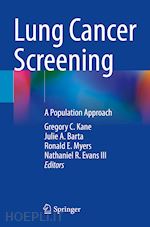
Questo prodotto usufruisce delle SPEDIZIONI GRATIS
selezionando l'opzione Corriere Veloce in fase di ordine.
Pagabile anche con Carta della cultura giovani e del merito, 18App Bonus Cultura e Carta del Docente
This book is a comprehensive guide to lung cancer screening for clinicians, healthcare systems, community leaders, and public health officials with the hope of creating a more equitable landscape in both lung cancer screening and lung cancer-related outcomes, at local, state, and national levels. Authors take a new approach to primary and secondary lung cancer prevention that is in the early stages of adoption in the United States. The last decade ushered in recognition of screening as an effective intervention, but unfortunately, despite the wide acceptance of the importance of this new screening modality, nationally, not more than 5% of eligible subjects have undergone screening to date in the United States, although in some states uptake has reached as high as 16%. As is common with any new preventive cancer screening, racial and socioeconomic disparities emerge in utilization, stage at diagnosis, and mortality. Over time, these disparities decline, but consequential differences endure. Therefore, it is critical to establish equitable screening practices.
The true measure of the effectiveness of any lung cancer screening program needs to be viewed through the lens of its impact on populations, including those most affected by the morbidity and mortality of smoking-related illness and lung cancer. As such, this book emphasizes a number of important public health topics, including community outreach to vulnerable populations, social justice issues, addressing stigma and fatalism in the general community, and the use of geocoding to assess a program’s impact at a population level. This book weaves traditional topics related to lung cancer screening, such as promoting initial and repeat screening, interpreting Lung RADs, and managing the follow-up of findings, into the population perspective in order to present a unified, comprehensive approach to the subject. Further, it serves as a guide that health systems, health care professionals, community leaders, and other stakeholders can use to achieve the promise of lung cancer screening.
Gregory C. Kane, MD, MACP
The Jefferson-National Jewish Health Korman Respiratory Institute
Division of Pulmonary and Critical Care Medicine
Department of Medicine
Sidney Kimmel Medical College at Thomas Jefferson University
Philadelphia, PA, USA
Julie A. Barta, MD, ATSF
The Jefferson-National Jewish Health Korman Respiratory Institute
Division of Pulmonary and Critical Care Medicine
Department of Medicine
Sidney Kimmel Medical College at Thomas Jefferson University
Philadelphia, PA, USA
Ronald E. Myers, DSW, PhD, FSBM
Division of Population Science
Department of Medical Oncology
Sidney Kimmel Cancer Center at Thomas Jefferson University
Philadelphia, PA, USA
Nathaniel R. Evans III, MD, FACS, FCCP
The Jefferson-National Jewish Health Korman Respiratory Institute
Division of Thoracic Surgery
Department of SurgerySidney Kimmel Medical College at Thomas Jefferson University
Philadelphia, PA, USAu











Il sito utilizza cookie ed altri strumenti di tracciamento che raccolgono informazioni dal dispositivo dell’utente. Oltre ai cookie tecnici ed analitici aggregati, strettamente necessari per il funzionamento di questo sito web, previo consenso dell’utente possono essere installati cookie di profilazione e marketing e cookie dei social media. Cliccando su “Accetto tutti i cookie” saranno attivate tutte le categorie di cookie. Per accettare solo deterninate categorie di cookie, cliccare invece su “Impostazioni cookie”. Chiudendo il banner o continuando a navigare saranno installati solo cookie tecnici. Per maggiori dettagli, consultare la Cookie Policy.